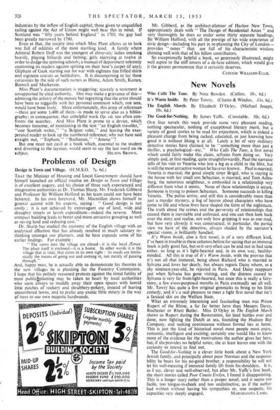New. Novels
The Good-for-Nothing. By James Yaffe. (Constable. 10s. 60.)
OUR four novels this week provide some very pleasant reading, nothing spectacular, nothing of exceptional literary merit, but a
variety of good stories to be read for enjoyment, which is indeed a pleasant change from being racked, educated, or just knowing how good it is without liking it at all. Lately a lot of very ordinary
detective stories have claimed, to be —something more than just a thriller, a psychological—etc." Who Calls The Tune, a first novel which could fairly make this claim, refrains from doing so. Very simply and, at first reading, quite straightforwardly, Paul the narrator tells of his visit to Venetia who lost a leg as a child in the blitz, but is still the most attractive woman he has ever known. Paul is married; Venetia is married; the good simple sister Brigid, who is staying in the house with her small son Sebastian, is married, and Tom Adles- burg, the notorious neighbour, is embroiled in a relationship very different from what it seems. None of these relationships is secure. Someone is trying to poison Sebastian. Someone succeeds in killing Venetia. The police arrive, and still this is considerably more than just a murder mystery, a fog of horror about characters who have come to life and whose lives have shaped the form of the nightmare. The truth about the crimes and the perversity of relationships that caused them is inevitable and unforced, -and one can then look back over the story and realise, not only how gripping it was as one read,
' but how very cleverly it was constructed; in particular, the partial view we have of the detective, always shaded by the narrator's special vision, is brilliantly handled.
It's Warm Inside, also a first novel, is of a very different kind. I've been in trouble in these columns before for saying that an immoral book is jolly good fun, but so it very often can be and not in bad taste either, so long as it's light-hearted and, in its own way, healthy. minded. All this is true of It's Warm Inside, with the proviso that it's not all that immoral, being about Richard who is married to Sylvana and loves her dearly, but always regrets Daisy whom, as a shy nineteen-year-old, he rejected in Paris. And Daisy reappears just when Sylvana has gone visiting, and the distress caused to Sylvana is very far from light-hearted, but since this is really a fairy- story, a few cross-purposed months in Paris eventually see all well. Mr. Towry has quite a few original gimmicks to bring to his little comedy, and it's a real pleasure to meet a light first novel that isn't a farcical skit on the Welfare State.
What an extremely interesting and fascinating man was Prince Rupert of the Rhine, a far far better hero than Messers Darcy, Rochester or Rhett Butler. Miss D'Oyley in The English March shows us Rupert during the Restoration, his land battles over and done, now fighting the Dutch at sea, founding the Hudson Bay Company, and seeking continuance without formal ties at home. This is just the kind of historical novel most people most ;enjoy, romantic, intelligent and exciting; certainly one would like to know more of the evidence for the motivations the author gives her hero, but, if she provides no helpful notes, she at least leaves one with the curiosity to intend to find out.
The Good-for-Nothing is a clever little book about a New York Jewish family, and principally about poor Norman and the responsi- bility he bears for his no-good brother, a responsibility he will not let his well-meaning if immoral family lift from his shoulders. It is, as I say, clever and well-observed, but after Mr. Yaffe's first book, the short stories called Poor Cousin Evelyn, I found it disappointing. This is a longer story rather than a proper novel, and it seems too facile, too tongue-in-cheek and too undistinctive, as if the author had written ,without having his sympathies or, one suspects, his


































 Previous page
Previous page